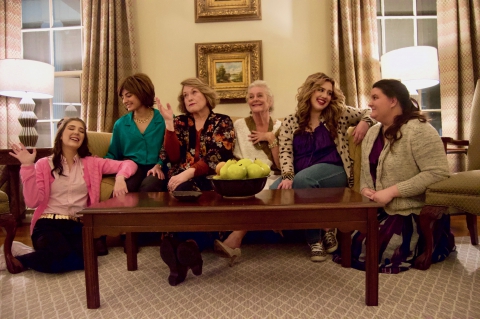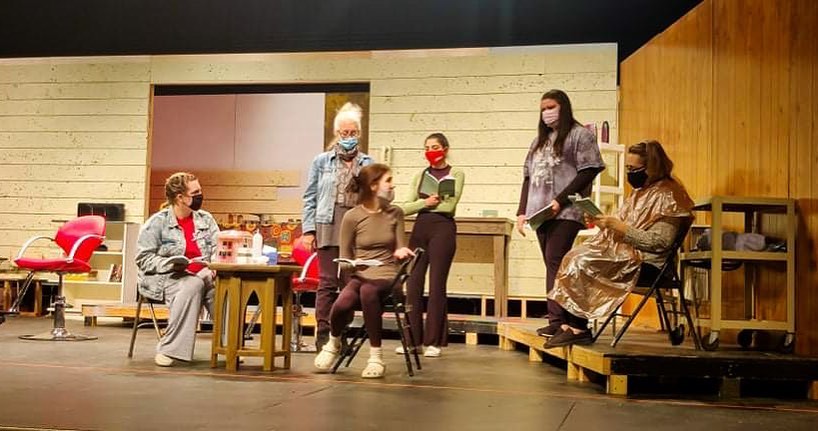Popular play will be held three nights in March

Story: Phillip Tutor | Photos: Cameron Jones
For three nights in March, students and faculty at the University of West Alabama will do something the pandemic stalled but couldn’t ultimately prevent — stage a production of “Steel Magnolias,” the renowned 1987 play that humanizes the depths of Southern women’s relationships and life experiences.
For that, director Rhonda Wooley couldn’t be more ecstatic.
“‘Steel Magnolias’ is something that I wish I could direct every year,” said Wooley, an assistant professor of theatre at UWA. “To tell you the truth, it’s one of my favorite stories, and it’s one of the best-written scripts that I’ve ever worked with.”
Written by Robert Harling, “Steel Magnolias” revolves around six friends in a fictional northwest Louisiana parish and how they navigate their individual storms. Central in the story is the health and eventual death of character Shelby Eatenton-Latcherie, who suffers from Type 1 diabetes. The off-Broadway play debuted on Broadway in 2005. The film adaptation earned Julia Roberts, who played Shelby, a Golden Globe Award in 1990 for Best Supporting Actress-Motion Picture.
UWA’s productions of “Steel Magnolias” will take place March 16, 17 and 18 at the UWA Auditorium in the Math and Science Building. Each performance begins at 7 p.m. General-admission tickets for UWA students, faculty and staff are free, and $10 for others.
The all-female cast features four UWA students, including two from Chatom in Washington County: Kaylee Owens, a sophomore interdisciplinary arts major, who will portray Truvy Jones, and Karleigh Knapp, a freshman secondary education major, who will play Annelle Dupuy-DeSoto. Janna Williamson, a junior secondary education major from Cleveland in Blount County, is cast as Shelby. And Noura Hassan, an international student from Unterschleisshein, Germany, will portray M’Lynn Eatenton.
Dr. Debbie Davis, an associate professor of languages and literature at UWA, will play Clairee Belcher, and Suzanne McGahey, artistic director of the Sumter Theatre Workship, will portray Louisia “Ouiser” Boudreaux.

The decision to stage “Steel Magnolias,” as well as much of the play’s casting, was made prior to the steep reduction of on-campus events due to the pandemic, Wooley said. Absent that, the UWA productions would have been held in the fall of 2020.
The slowdown, though, didn’t cause Wooley to call an audible on her post-pandemic plans.
“We are really gearing up for this,” she said. “It’s been anticipated not only by us, but many of the cast members who have been waiting about a year and a half for this. And some of the faculty who enjoy this production have told me, ‘I’ll be so glad when you can stage it.’”
Wooley chose “Steel Magnolias” as the department’s next effort for myriad reasons, not the least of which was the play’s popularity and its small cast that would ease logistics. The pre-pandemic goal was to use the well-known play as kindling for growth of on-stage productions at UWA.
“‘Steel Magnolias’ is something that I wish I could direct every year. To tell you the truth, it’s one of my favorite stories, and it’s one of the best-written scripts that I’ve ever worked with.”
— Director Rhonda Wooley
The other reason? Wooley absolutely adores it.
“I’m going to sound really artsy here, but there is magic in this script,” said Wooley, who has starred in “Steel Magnolia” performances during her time as a traveling actor. “There is not just a connection that (Harling) makes between women and the deep, deep, loving relationships that women can have with one another. But it’s the way that the character who dies, the way her story is told, you almost feel like you are living it with these women, that you’re going through the whole process with them.”
The script, Wooley said, also eases the burden felt by directors who try to guide a cast through storylines many audience members know well.
“It’s almost as if you don’t have to do much with it,” she said. “It’s so well written, and it’s almost like you plunk out this time of life with these six ladies and put it on stage. The playwright really relieves you of a lot of the work of having to act it and having to direct it, because everything that you need is in that script. I just think it’s brilliant, there’s some kind of magic there.”